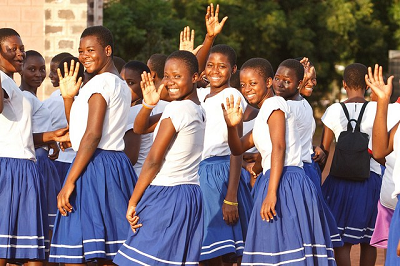
Teachers told not to engage services of schoolgirls at home
The Director in charge of Girls Education Unit of the Ghana Education Service (GES), Madam Nutsugah Mikado, has cautioned male teachers to desist from engaging the services of schoolgirls in their homes.
She said: "We have realised that most male teachers of late take undue advantage of girls by sending them on errands and also abusing them, which is against the code of ethics of the GES. Some of the male teachers also use the school girls as maidservants by taking them to the house to cook and wash for them”.
Madam Mikado gave the warning at separate ceremonies to present food and cash to beneficiaries from the participating schools in the food and cash incentive programme, at Kulkpeni in the Yendi Municipality in the Northern Region and Keri in the Nkwanta South District in the Volta Region, respectively.
Girls’ education
The programme is being implemented by the World Food Programme (WFP) to promote girls education in the Northern Savannah Ecological Zone (NSEZ) of the country.
The programme is currently benefitting a total of 17,000 girls from deprived communities in the three regions of the north and parts of northern Volta.
The programme started in 1998/99 with 9,000 girls, with the figure rising to 42,000 beneficiaries within 20 years.
It is phasing out by the close of this year, with 17,000 girls still on the programme, after attaining improved gender parity in education in the beneficiary areas.
Under the programme, the beneficiaries, who are girls from deprived communities, were provided with food and cash to encourage them to remain in school and complete their basic education.
It is also to help address the nutritional and health needs of the young girls, who are the beneficiaries of the programme.
At Keri, 1,376 girls from 25 schools in Nkwanta South benefited while at Kulkpeni in the Yendi Municipality, 113 girls from the Kulkpeni JHS benefitted
Financial constraint
Speaking at both ceremonies, the Country Director and WFP Representative, Ms Rukia Yacoub, noted that high school drop-out rates among young girls in the rural areas were associated with financial constraints and that encouraged the WFP to assist the vulnerable.
She said retention rates in most of the participating schools had improved from 40 per cent to 90 per cent following the introduction of the incentive that had encouraged more girls to attend school regularly.
She indicated that as the programme was drawing to an end, the WFP had initiated an Adolescent Sexual Reproductive Health programme for girls to reduce cases of teenage pregnancy, which was also a factor in the poor enrolment of girls.
The Director for Policy, Planning, Monitoring and Evaluation at the Ministry of Gender, Children and Social Protection, Mr Mawutor Ablo, commended the WFP for the support to encourage the enrolment of girls in school.
